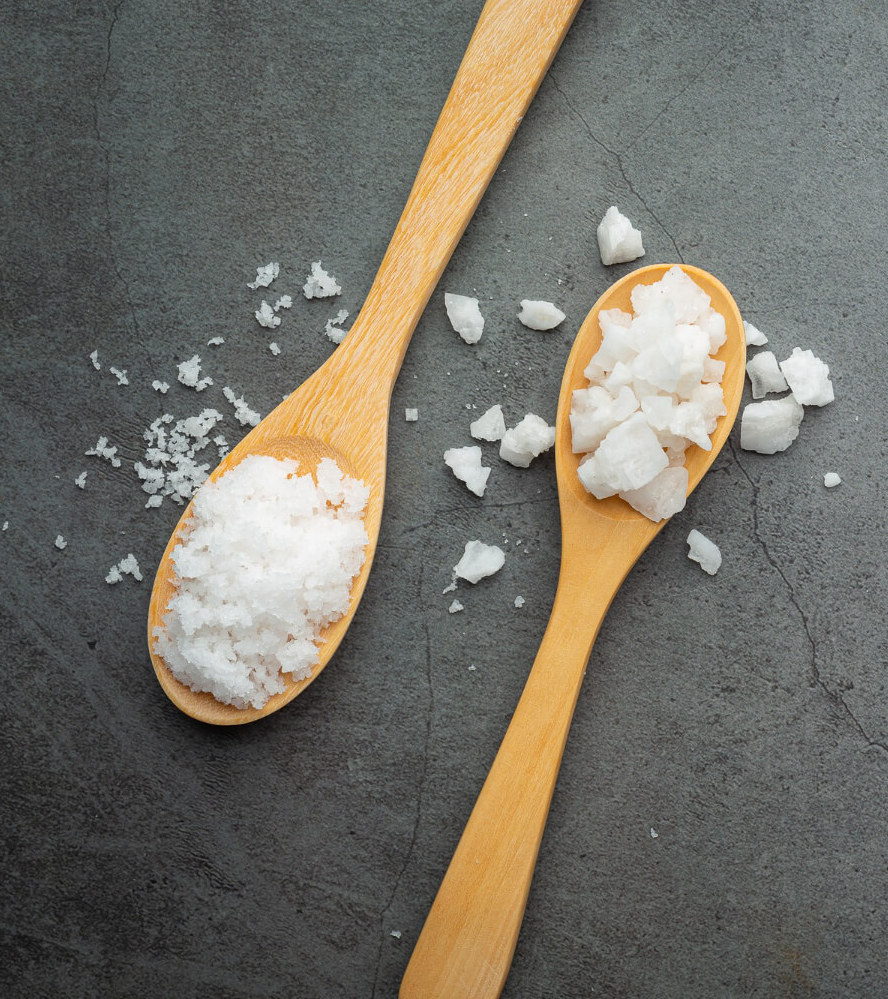Welcome to our ultimate guide on sodium, a crucial mineral that plays a vital role in maintaining your body's balance and functions.
In this blog, we'll explore what sodium is, its functions within the body, its dietary sources, and the recommended daily intake. We'll also take a closer look at the impact of sodium on optimal health and the importance of being mindful of your sodium intake.
What Is Sodium?
Sodium is an essential mineral that our bodies need to function properly. It is an electrolyte, which means it carries a charge that helps regulate fluid balance both inside and outside your cells. With this, it acts like a chemical battery that powers our nerve impulses and muscle contractions. Sodium is one of the ingredients in many foods that we consume throughout the day and enables the body to perform various functions at the optimal level.

What Does Sodium Do In The Body?
Sodium plays a crucial role in several physiological processes, including:
Fluid Balance: It helps regulate the balance of fluids in and around our cells, ensuring proper fluid balance (osmolarity) and normal cell functions.
Nerve Function: It aids in transmitting nerve impulses throughout the body, facilitating communication between nerves and muscles.
Muscle Contraction: It is essential for proper muscle function, including the contraction and relaxation of muscles
Blood Pressure Regulation: It works in conjunction with other minerals, such as potassium, to maintain healthy blood pressure levels.
Sodium Sources: What Foods Contain Sodium?
You get sodium primarily from table salt. Salt represents sodium chloride, known in the body as just "sodium". Sodium in salt makes up most of your daily intake. With this, it is found in various foods naturally or additionally, including:
- Cheese and dairy products
- Meat and fish
- Baking soda and baking powder
- Processed and packaged foods
- Condiments and sauces
How Much Sodium Can Be Taken Daily?
While sodium is essential for our bodies, excessive intake can lead to health issues, particularly high blood pressure and an increased risk of heart disease. The recommended daily intake of sodium varies depending on age, health status, and specific need. In general, the Dietary Guidelines for Americans suggests the following:
Adults: Aim for no more than 2,300 mg of sodium per day.
Certain Populations: People with high blood pressure, chronic kidney disease, or other specific conditions should limit sodium intake to 1,500 mg per day.
In fact, for a healthy adult, a small amount of sodium- a teaspoon of table salt consumption will be enough to get the sodium they need.
Processed Foods & The Effect On Sodium Levels
Processed and prepared foods often contain high levels of sodium, which can contribute to exceeding the recommended daily intake. Some reasons for this high sodium content include preservation, flavor enhancement, and texture improvement. Regularly consuming processed foods with high sodium amounts can lead to health problems, such as hypertension, and an increased risk of cardiovascular diseases.
It's essential to read nutrition facts labels and choose reduced-sodium or sodium-free alternatives when possible. Opting for fresh, whole foods like fruits, vegetables, and lean proteins can significantly reduce sodium intake.

What Is Sodium Deficiency?
Sodium deficiency, also known as hyponatremia (6), occurs when the level of sodium in your blood drops below the normal range. Sodium is an electrolyte that helps regulate the water balance in and around your cells. When the sodium levels are too low, your body may not function optimally, leading to various health conditions.
Regular mineral consumption prevents sodium deficiency, so it is important to be mindful of your mineral intake.
Urine tests can help determine whether there are abnormal levels of sodium in your body. You might have low sodium levels if there is not enough sodium found in the body, if it is not being consumed in too sufficient amounts consistently, or if the body is unable to excrete sodium. The main cause of sodium deficiency is consistent low salt consumption.
What Are The Symptoms Of Sodium Deficiency?
When you have sodium deficiency, it can cause weakness in your body and lead to more frequent headaches. Restlessness is another mild symptom that often accompanies low sodium intake. With this, the deficiency may present itself with various symptoms, including:
- Nausea
- Irritability
- Muscle cramps and spasms
What Diseases Does Sodium Deficiency Cause?
Sodium deficiency, or hyponatremia, can contribute to the development of various health conditions, including:
Neurological Issues: Sodium plays a crucial role in maintaining nerve function. Its deficiency can lead to neurological issues.
Muscle Disorders: Sodium is essential for proper muscle contraction. Its deficiency may result in muscle weakness and cramps.
Hypotension: Sodium helps regulate blood pressure. Its deficiency may cause hypotension (low blood pressure), leading to dizziness and fainting.
Identifying and addressing sodium deficiency promptly is essential to preventing and managing these associated diseases effectively.
How To Check Sodium Levels?
Checking your sodium levels is a crucial step in understanding your wellness. Certain tests measure the amount of sodium in your body and will help determine if your sodium levels are within a healthy range or if there is cause for concern.
Identifying sodium levels can be evaluated by more than one method. However, it should be noted that each test measures a function in itself. They do not replace each other, but complete each other.
Blood Tests: A basic metabolic panel is used to measure sodium levels in your blood.
Urine Tests: Analyzing urine sodium levels helps assess the sodium amount of intake from your diet and how much your body is excreting accordingly.
Additional Tests: In some cases, your healthcare provider may order other tests to determine other conditions.
Measurement with Specific Ion Electrode: Another method used to measure the sodium concentration in urine is the ion electrode method. Glass electrodes that are used in this method are sensitive to sodium activity, and the concentration of sodium in urine is determined by taking millivolt readings accordingly. At the end of the test, the sodium concentration in urine is calculated with the help of the reference curve.
If you have specific health conditions or take medications that could affect your sodium levels, regular monitoring may be necessary. With this, an early and accurate check is crucial for identifying the root cause of the deficiency. Regular monitoring of sodium levels is essential for managing your wellness effectively.

Sodium Intake and Urine Extraction
Salt is a vital electrolyte source that regulates the human body's essential functions and represents sodium chloride. Sodium chloride is found in the urine in ionized form, and the urine sodium reflects the amount of sodium in the sodium chloride. Most of your daily sodium intake comes from table salt. In other words, the amount of sodium in the urine is actually an indicator of your salt consumption.
The general method for estimating daily sodium intake is 24-hour urine collection, as it is possible to calculate your daily salt through urine. While it is possible to lose sodium from your body through other means such as through sweat, approximately 90% of your daily salt intake through your diet is excreted through your urine. The 24-hour urine collection can therefore act as a reliable estimate of your salt consumption (10). With this, you can instantly monitor the body's sodium status with urine tests that formulate instant measurements.
The urinary excretion of sodium varies depending on ethnicity or race, age, and biological sex. In addition, daily sodium intake, environmental factors, chronic diseases, and drug use affect sodium excretion. Sodium intake and urinary sodium excretion are higher in men than women, adults than children, and young and middle-aged adults compared to the elderly.
How Is Sodium Deficiency Treated?
The good news is that sodium deficiency is often reversible with appropriate intervention. The approach to reversing sodium deficiency depends on its severity and the underlying cause. Here are some common methods used to address sodium deficiency:
Increasing Sodium Intake: In mild cases of sodium deficiency, increasing your sodium intake through dietary sources can help restore normal levels. Including foods rich in sodium, such as table salt, pickles, and certain types of cheese can be beneficial.
Electrolyte Drinks: In moderate cases, electrolyte drinks containing sodium and other essential electrolytes can be consumed to help replenish the sodium levels in the body.
Medical Intervention: In severe cases or when sodium deficiency is caused by an underlying medical condition, medical interventions may be necessary. This can include administration of sodium solutions.
It is essential to work closely with a professional to determine the most suitable plan for your specific situation.
Remember, taking proactive steps to address sodium deficiency can lead to improved overall health and well-being.
What Happens If Sodium Is High?
When your sodium levels are high, it can lead to several health issues. Excessive sodium intake can cause your body to retain water, leading to bloating and swelling. Over time, this can put strain on your heart and blood vessels, potentially increasing the risk of high blood pressure and heart disease. High sodium levels may also contribute to kidney problems, as the kidneys work harder to eliminate the excess sodium from your body. Therefore, it's essential to be mindful of limiting sodium intake and strive for a balanced diet.

Sodium and Blood Pressure Relations
One of the most significant concerns regarding sodium is its impact on blood pressure. High sodium consumption is associated with elevated blood pressure in some individuals. When there is too much sodium in your bloodstream, it attracts water, increasing the volume of blood flowing through your blood vessels. This, in turn, raises the pressure on your artery walls. Over time, high blood pressure can strain the heart and damage the blood vessels, leading to cardiovascular problems. Managing your sodium intake and adopting a heart-healthy diet can be beneficial in maintaining a healthy blood pressure level.
How To Test Your Sodium Levels at Home?
If you want to get a quick estimate of your sodium levels at home, you can use urine tests. These strips are designed to provide a quantitative measurement of sodium in urine. They offer valuable insights into your sodium intake and excretion. To use urine test strips, si
mply follow the instructions provided with the kit. It's essential to note that these test strips are not a substitute for professional medical advice or diagnosis, but they can be a helpful tool for personal monitoring.
How Sodium Test Strips Work?
Urine test strips work based on ion exchange technology. When you dip the strip into a urine sample, the sodium ions in the urine interact with the strip's material, causing an exchange of ions. The strip then changes color, and by comparing the color change with a color chart provided with the kit, you can estimate your sodium levels.



















